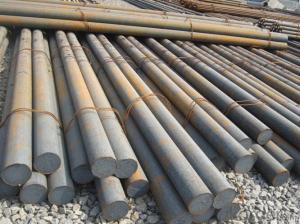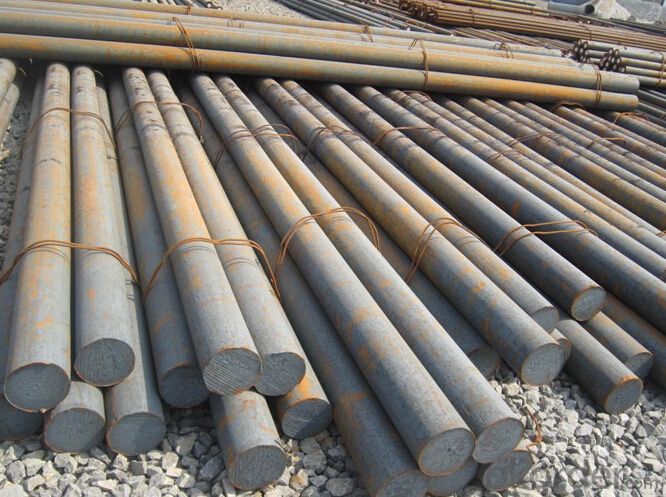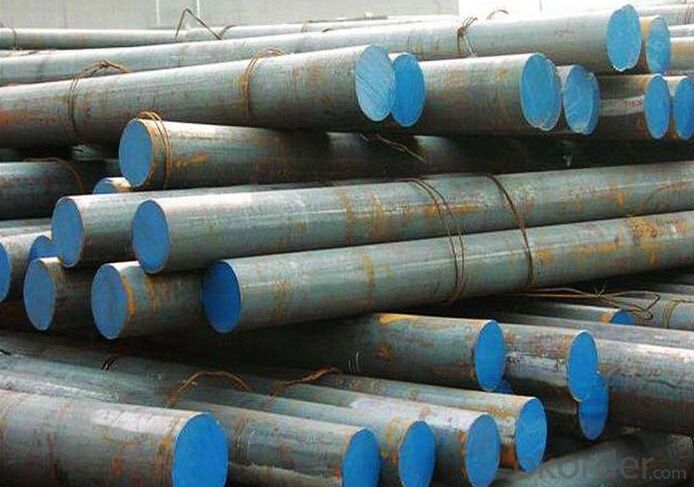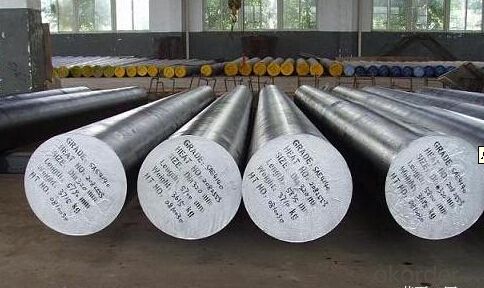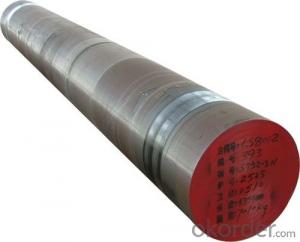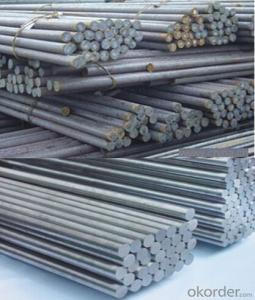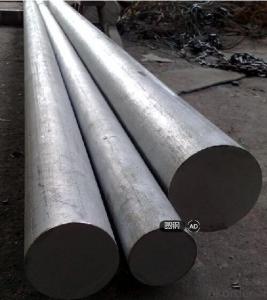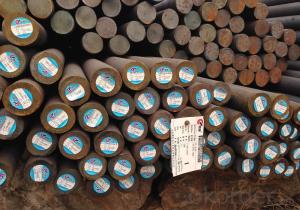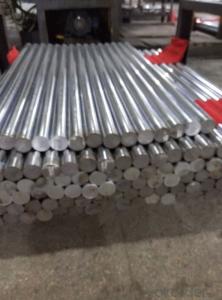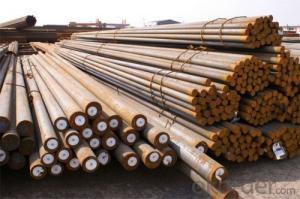Astm 1320/Aisi 4140 Alloy Steel Bar And Alloy Steel Rod
- Loading Port:
- Qingdao
- Payment Terms:
- TT OR LC
- Min Order Qty:
- 5 m.t.
- Supply Capability:
- 100000 m.t./month
OKorder Service Pledge
Quality Product, Order Online Tracking, Timely Delivery
OKorder Financial Service
Credit Rating, Credit Services, Credit Purchasing
You Might Also Like
Specification
Type:
Carbon Steel,Alloy Steel,Stainless Steel,Deformed Steel,Gear Steel,Bearing Steel,Spring Steel
Shape:
Steel Billets,Steel Round Bar,Steel Angle,Steel Square Bar,Steel Flat Bar,Steel Wire Rod,Steel Sheet,Steel Coil
Technique:
Spring,EFW,Extruded,Saw,Forged,ERW,Cold Drawn,Cold Rolled,Hot Rolled
Surface Treatment:
Galvanized,Coated,PVDF Coated,Black,Bright,Polished,Chromed Passivation,Dry,Oiled,Color Coated,Copper Coated
Certification:
UL,BSI,API,CE,RoHS,IBR,BV,SGS,ISO
Thickness:
80-800mm
Width:
80-800mm
Length:
6-12m
Outer Diameter:
80-800mm
Net Weight:
100kg
Packaging:
seaworthy packaging
Astm 1320/Aisi 4140 Alloy Steel Bar And Alloy Steel Rod
Detailed Information of Astm 1320/Aisi 4140 Alloy Steel Bar And Alloy Steel Rod
| Name | Steel Round Bar |
| Shape | Round Bar/Square Bar/Flat Bar/Plate/Wire |
| Standard | GB/ASTM/SAE/AISI/DIN/JIS/EN/BS |
| Surface Treatment: | Black/Peeling/Polished/Machined |
| Delivery Condition: | Hot Rolled or Forged/Peeled or Black Surface |
| Test | SGS/UT 100% Elements Testing |
| Certificate: | ISO/Mill Certificate |
| Service: | 24 hours online service / |
| more than 20 years trading and manufacture | |
| Quality Assurance: | the third party inspection, such as SGS, BV, TUV…etc. is acceptable |
| Packaging Details: | Seaworthy Packaging or as per customer's packing instruction |
Product Overviews of Astm 1320/Aisi 4140 Alloy Steel Bar And Alloy Steel Rod
| Product Name | Typical Grades | Diameter(mm) | Standard Adopted |
| Carbon Steel | 20 (1020/S20C/C22) | ||
| 40 (1040/S40C/C40) | Ø16-Ø300 | ||
| 45 (1045/S45C/C45) | |||
| Bearing Steel | GCr9 (51100/SUJ1) | ||
| GCr15 (52100/SUJ2/100Gr6) | Ø12-Ø250 | ||
| GCr9SiMn (A485-Gr.1/SUJ3) | GB/SAE/ | ||
| Cr-Mo Steel | 20Cr (5120/SCr420H/20Cr4) | JIS/DIN | |
| 40Cr (5140/SCr440/41Cr4) | Ø12-Ø250 | ||
| 42CrMo(4140/SCM440/42CrMo4) | |||
| Gear Steel | 20CrNiMo | ||
| 20CrMn(5115/SMnC420/20MnCr5) | Ø16-Ø600 | ||
| 20CrNiMo(8620/SNCM220/20CrMiMo2) |
Company Introduction of Astm 1320/Aisi 4140 Alloy Steel Bar And Alloy Steel Rod
CNBM International Corporation is the most import and export platform of CNBM group(China National Building Material Group Corporation) ,which is a state-owned enterprise, ranked in 270th of Fortune Global 500 in 2015.
With its advantages, CNBM International are mainly concentrate on Cement, Glass, Iron and Steel, Ceramics industries and devotes herself for supplying high quality series of refractories as well as technical consultancies and logistics solution.
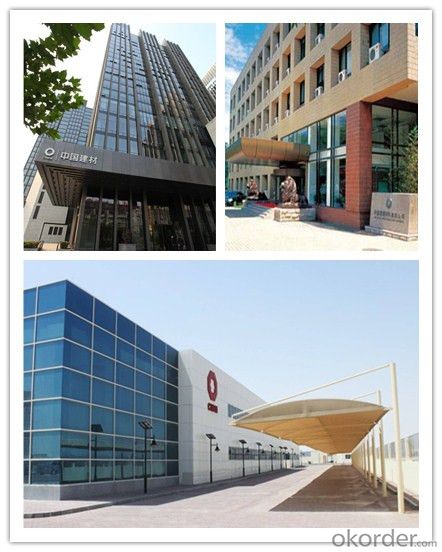
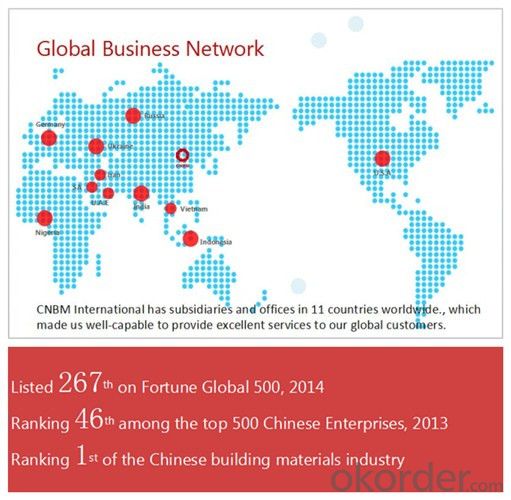
| After-sale service | l CNBM provides the services and support you need for every step of our cooperation. We’re the business partners you can trust; you can relax and get on with doing business. |
| l For any problem, please kindly contact us at any your convenient time, we’ll reply you in our first priority within 24 hours | |
| Advantages | l Industry experience over 20 years. |
| l Shipment of goods -More than 70 countries worldwide. | |
| l The most convenient transport and prompt delivery. | |
| l Competitive price with best service. | |
| l High technical production line with top quality products. | |
| l High reputation based on best quality products. | |
Packaging & Delivery of Astm 1320/Aisi 4140 Alloy Steel Bar And Alloy Steel Rod
| Packaging Detail | Sea worthy packing /as per customer's packing instruction |
| Delivery Detail | 15 ~ 40 days after receiving the deposit |
Products Show
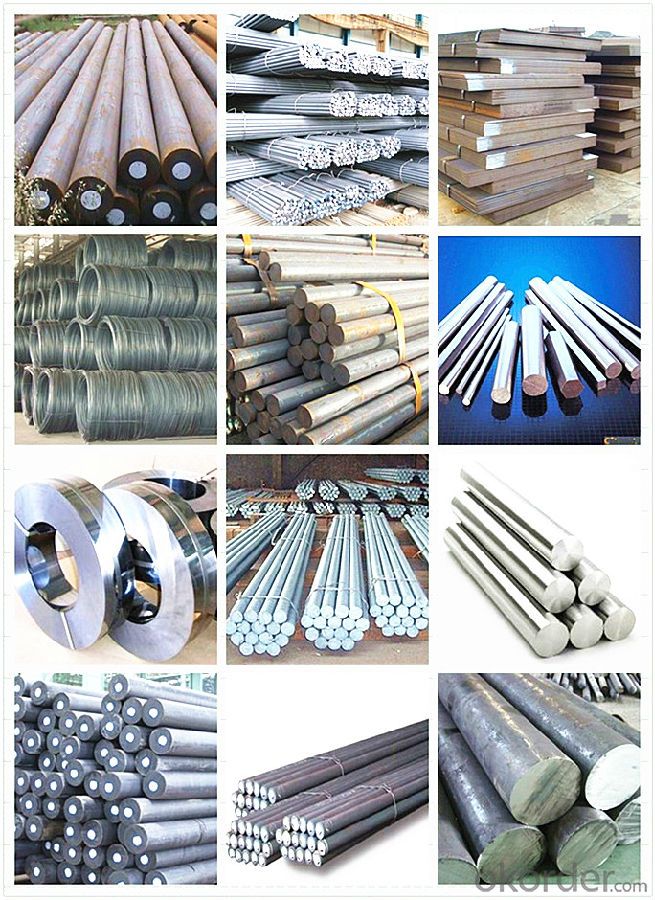
FAQ:
| Are you a trading company or manufacturer? | Manufacturer |
| What’s the MOQ? | 1000m2 |
| What’s your delivery time? | 15-20 days after downpayment received |
| Do you Accept OEM service? | Yes |
| what’s your delivery terms? | FOB/CFR/CIF |
| What's the Payment Terms? | 30% as deposit,70% before shipment by T/T |
| Western Union acceptable for small amount. | |
| L/C acceptable for large amount. | |
| Scrow ,Paybal,Alipay are also ok | |
| Why choose us? | Chose happens because of quality, then price, We can give you both. Additionally, we can also offer professional products inquiry, products knowledge train (for agents), smooth goods delivery, excellent customer solution proposals. |
| What's your available port of Shipment? | Main Port, China |
| What’s your featured services? | Our service formula: good quality+ good price+ good service=customer's trust |
| Where are your Market? | Covering more than 160 countries in the world |
- Q: How does tool and die steel maintain its hardness and wear resistance?
- Tool and die steel maintains its hardness and wear resistance through a combination of factors such as its chemical composition, heat treatment, and surface treatments. The steel is typically alloyed with elements like chromium, vanadium, and tungsten, which enhance its hardness and wear resistance properties. Additionally, through heat treatment processes like quenching and tempering, the steel is subjected to controlled heating and cooling cycles, which further contribute to its desired hardness and toughness. Surface treatments like nitriding or coating with materials like titanium nitride can also be applied to improve the wear resistance of the steel. Overall, it is the careful selection of steel composition, precise heat treatment, and appropriate surface treatments that enable tool and die steel to maintain its hardness and wear resistance.
- Q: How is special steel used in the production of precision tools?
- Special steel is used in the production of precision tools due to its unique properties such as high strength, durability, and resistance to corrosion. This steel is carefully engineered and manufactured to meet specific requirements, enabling the production of precise and reliable tools. The use of special steel in precision tool manufacturing ensures that these tools can withstand heavy usage, maintain their sharpness, and provide accurate results, making them crucial for various industries such as automotive, aerospace, and engineering.
- Q: Can special steel be used in the electronics manufacturing industry?
- Yes, special steel can be used in the electronics manufacturing industry. Special steel alloys, such as stainless steel or high-strength low-alloy (HSLA) steel, offer excellent properties like corrosion resistance, electrical conductivity, and magnetic shielding, making them suitable for various electronic components like connectors, sensors, circuit boards, and casings. These specialized steel materials ensure durability, protection, and reliable performance in demanding electronic applications.
- Q: How is structural steel used in building construction?
- Structural steel is widely used in building construction for its strength, durability, and versatility. It is used to create the main framework of buildings, including columns, beams, and trusses, providing support and stability to the structure. The use of structural steel allows for large open spaces, as it can span long distances without the need for additional support. Additionally, it is often used in the construction of high-rise buildings, bridges, and industrial structures, due to its ability to withstand heavy loads and resist extreme weather conditions.
- Q: How does special steel behave under different types of loading conditions?
- Special steel behaves differently under different types of loading conditions. When subjected to tension, it stretches and elongates, but still maintains its strength. Under compression, it can withstand high pressures without deformation. Special steel also exhibits excellent resistance to bending, allowing it to maintain its shape under bending loads. Furthermore, it has high fatigue strength, making it suitable for applications involving cyclic or repetitive loading. Overall, special steel demonstrates superior mechanical properties and performance under various loading conditions.
- Q: How does special steel contribute to the agricultural industry?
- In the agricultural industry, special steel plays a crucial role in providing strong and high-performing parts for a range of farming equipment. Its unique characteristics, including strength, toughness, and resistance to corrosion, make it perfect for enduring the challenging conditions encountered in agricultural operations. One important use of special steel in agriculture is in the production of tillage tools like plows, harrows, and cultivators. These tools experience intense forces and abrasion while breaking the soil, and special steel ensures their durability and effectiveness even after extended periods of use. The steel's toughness and resistance to wear reduce the need for frequent replacements, improving the overall productivity and cost-effectiveness of agricultural activities. Moreover, special steel is extensively utilized in the manufacturing of harvesting machinery such as combine harvesters, grain conveyors, and crop processing equipment. These machines require parts that can withstand the continuous stress and impact of harvesting and processing operations. Special steel's exceptional strength and ability to resist fatigue allow these machines to handle heavy loads and endure prolonged usage without compromising performance or safety. Additionally, special steel finds application in constructing irrigation systems, storage tanks, and other necessary infrastructure for efficient water management in agriculture. The steel's resistance to corrosion and durability ensure that these structures can endure the challenging conditions of moisture and chemicals present in agricultural environments, guaranteeing their long-lasting functionality. All in all, special steel significantly contributes to the agricultural industry by providing long-lasting and dependable parts for various farming equipment and infrastructure. Its properties enhance the efficiency, productivity, and longevity of agricultural machinery and structures, ultimately benefiting farmers and promoting the overall sustainability of agricultural practices.
- Q: How does special steel contribute to the heat resistance of products?
- The heat resistance of products is enhanced by special steel, which possesses superior mechanical properties that enable it to withstand high temperatures without deforming or compromising its structural integrity. The unique composition and manufacturing process of special steel result in improved heat resistance, making it an ideal material for applications exposed to extreme heat conditions. Compared to standard steel, special steel is designed with a high melting point, enabling it to endure higher temperatures. This is achieved through the inclusion of alloying elements like chromium, nickel, molybdenum, or vanadium, which enhance the steel's ability to withstand heat. These elements create stable oxide layers on the steel's surface, acting as a barrier against oxidation and preventing strength loss or brittleness when subjected to high temperatures. Moreover, special steel often undergoes heat-resistant coatings or specialized heat treatment processes to further enhance its heat resistance. These treatments, such as quenching and tempering, annealing, or precipitation hardening, modify the steel's microstructure, improving its resistance to thermal fatigue, creep, and thermal shock. The heat resistance provided by special steel allows for the production of products suitable for demanding environments, including aerospace, automotive, power generation, and industrial applications. In the aerospace industry, for example, special steel is employed in the manufacturing of turbine blades that face exceptionally high temperatures in jet engines. In the automotive industry, it is used for producing exhaust systems and engine components that must withstand intense heat from combustion processes. To summarize, special steel enhances the heat resistance of products by providing a higher melting point, improved oxidation resistance, and enhanced mechanical properties, ensuring their structural integrity and functionality even in extreme heat conditions. This makes special steel an indispensable material for industries seeking durable and reliable solutions that can withstand high temperatures.
- Q: How does special steel contribute to improving product durability?
- Special steel contributes to improving product durability in several ways. Firstly, special steel is known for its high strength and toughness, which makes it more resistant to wear and tear. This means that products made with special steel are less likely to develop cracks, deformations, or other forms of damage during regular use. Additionally, special steel often has enhanced corrosion resistance properties, making it more resistant to rust and other forms of degradation. This helps to prolong the lifespan of products, particularly those exposed to harsh environments or extreme weather conditions. Moreover, special steel can also offer increased heat resistance, enabling products to withstand high temperatures without losing their structural integrity. Overall, the use of special steel in manufacturing processes significantly enhances the durability and longevity of products.
- Q: How does the demand for special steel vary across different regions?
- The demand for special steel can differ greatly in various regions due to multiple factors. One of the main drivers of demand fluctuation is the level of industrialization in a specific region. Developed regions like North America, Europe, and East Asia, which have strong manufacturing sectors, heavily rely on special steel for various industrial applications, resulting in higher demand. Another factor that affects demand variation is the presence of specific industries or sectors within a region. Regions with significant automotive or aerospace industries require high-performance materials like special steel for the production of vehicles or aircraft, leading to increased demand. Furthermore, the demand for special steel is influenced by the construction industry. Regions experiencing rapid urbanization and infrastructure development, such as Southeast Asia, the Middle East, and parts of Africa, have a higher demand for special steel to construct buildings, bridges, and other infrastructure projects. Moreover, the availability of raw materials and production capabilities within a region can impact the demand for special steel. Regions with abundant access to iron ore, coal, and other essential resources for steel production may experience higher demand as they can efficiently produce special steel. Lastly, economic trends and government policies also play a role in shaping the demand for special steel. Regions with stable economic growth and favorable policies for industries utilizing special steel are likely to have higher demand. Conversely, regions facing economic downturns or restrictive trade policies may witness a decline in demand. In conclusion, various factors, including industrialization levels, specific industries present, construction activities, availability of raw materials, and economic trends, contribute to the variation in demand for special steel across different regions. Understanding these variations is crucial for steel manufacturers and suppliers to effectively target and meet the diverse needs of different regions.
- Q: What are the requirements for special steel used in nuclear power plants?
- Stringent and critical requirements must be met for the special steel used in nuclear power plants to guarantee the safe and reliable operation of these facilities. Some of the key requirements include: 1. Exceptional strength and durability: The special steel must possess remarkable strength and durability to endure the extreme conditions and stresses found in nuclear power plants, such as high temperatures, pressure, and radiation levels. 2. Corrosion resistance: Corrosion can severely compromise the integrity of steel components in a nuclear power plant. Therefore, the special steel must exhibit high resistance to corrosion, including both general and localized corrosion, such as pitting and crevice corrosion. 3. Low neutron absorption: Neutron absorption plays a crucial role in the performance of reactor core materials in nuclear power plants. Therefore, the special steel used should have low neutron absorption characteristics to minimize interference with neutron flux and avoid any adverse effects on the overall operation and safety of the plant. 4. Radiation resistance: Nuclear power plants generate significant levels of radiation that can affect the properties and performance of materials over time. The special steel must be able to withstand radiation-induced embrittlement, degradation, and other forms of radiation damage, ensuring long-term mechanical integrity. 5. Compliance with regulations: The steel used in nuclear power plants must meet stringent regulatory standards and codes, such as those established by the Nuclear Regulatory Commission (NRC) in the United States or the International Atomic Energy Agency (IAEA) internationally. Compliance with these regulations ensures that the steel meets the necessary safety criteria and has been manufactured and tested to the highest standards. 6. Traceability and documentation: The traceability of the special steel used in nuclear power plants is of utmost importance. It is crucial to maintain comprehensive documentation, including material certifications, test reports, and manufacturing records, to ensure that the quality and origin of the steel can be verified throughout its lifecycle. In summary, the requirements for special steel used in nuclear power plants revolve around its ability to withstand extreme conditions, resist corrosion and radiation, comply with strict regulatory standards, and provide long-term structural integrity. These requirements are essential for the safe and efficient operation of nuclear power plants and the protection of human health and the environment.
Send your message to us
Astm 1320/Aisi 4140 Alloy Steel Bar And Alloy Steel Rod
- Loading Port:
- Qingdao
- Payment Terms:
- TT OR LC
- Min Order Qty:
- 5 m.t.
- Supply Capability:
- 100000 m.t./month
OKorder Service Pledge
Quality Product, Order Online Tracking, Timely Delivery
OKorder Financial Service
Credit Rating, Credit Services, Credit Purchasing
Similar products
Hot products
Hot Searches
Related keywords
